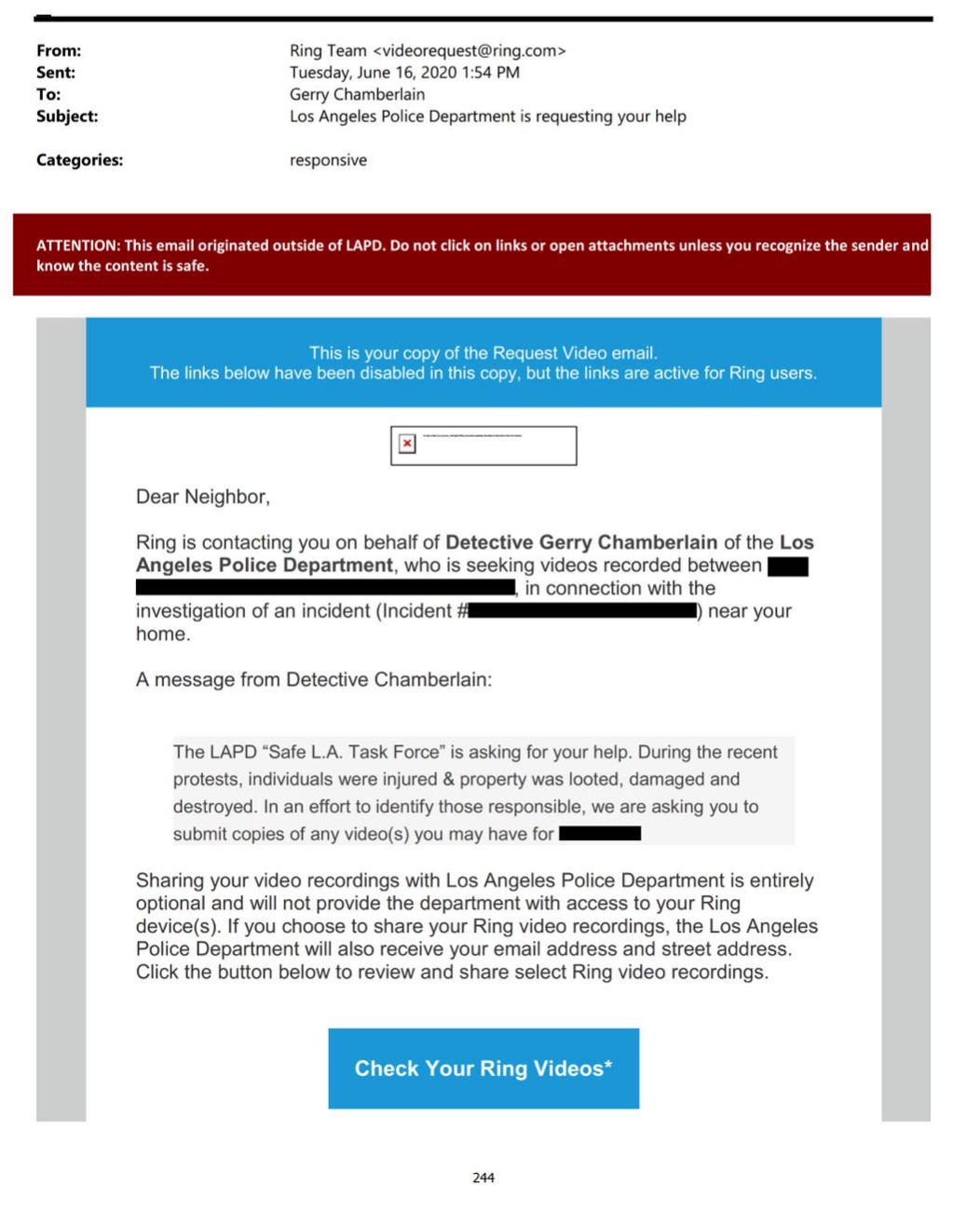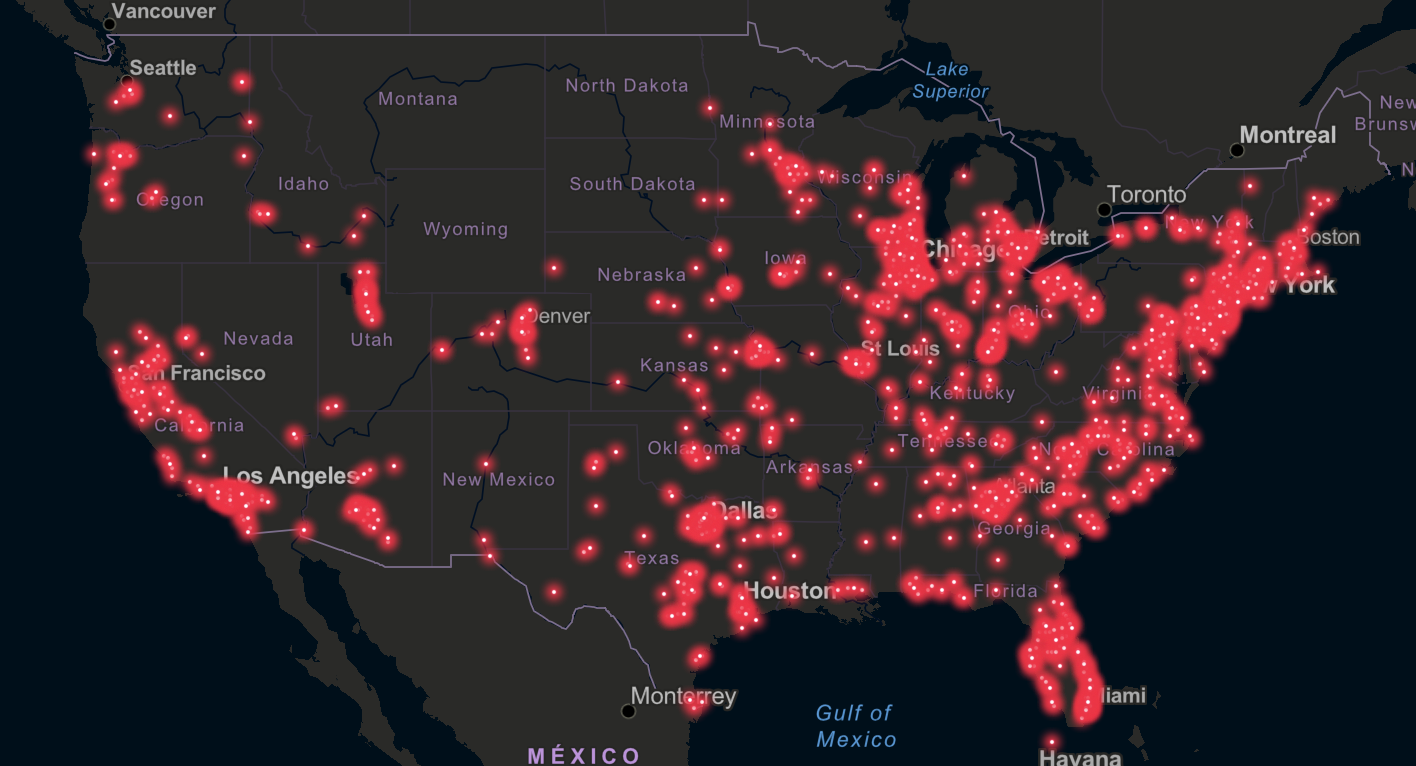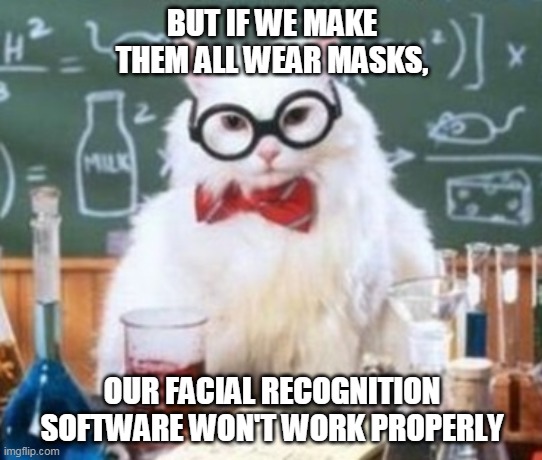LAPD Requested Ring Footage of Black Lives Matter Protests comes from the Electronic Frontier Foundation, a nonprofit organization defending civil liberties in the digital world. Ring is Amazon’s home security company most known for its doorbell camera.
Along with other civil liberties organizations and activists, EFF has long warned that Amazon Ring and other networked home surveillance devices could be used to monitor political activity and protests. Now we have documented proof that our fears were founded.
According to emails obtained by EFF, the LAPD sent requests to Amazon Ring users specifically targeting footage of Black-led protests against police violence that occurred in cities across the country last summer. While it is clear that police departments and federal law enforcement across the country used many different technologies to spy on protests, including aerial surveillance and semi-private camera networks, this is the first documented evidence that a police department specifically requested footage from networked home surveillance devices related to last summer’s political activity.
In May 2019, LAPD became the 240th public safety agency to sign a formal partnership with Ring and it’s associated app, Neighbors. That number has now skyrocketed to more than 2,000 government agencies. The partnerships allow police to use a law-enforcement portal to canvass local residents for footage.
Requests from police to Ring users typically contain the name of the investigating detective and an explanation of what incident they are investigating. Police requesting footage also specify a time period, usually a range spanning several hours, because it’s often hard to identify exactly what time certain crimes occurred, such as an overnight car break-in.

A June 16, 2020 email showing an LAPD request for footage to an Amazon Ring user.
In its response to EFF’s public records requests, the LAPD produced several messages it sent to Ring users, but redacted details such as the circumstances being investigated and the dates and times of footage requested. However, one email request on behalf of the LAPD “Safe L.A. Task Force” specifically asked for footage related to “the recent protests.” Troublingly, the LAPD also redacted the dates and times sought for the requested footage. This practice is concerning, because if police request hours of footage on either side of a specific incident, they may receive hours of people engaging in First Amendment protected activities with a vague hope that a camera may have captured illegal activity at some point. Redacting the hours of footage the LAPD requested is a cover up of the amount of protest footage the police department sought to acquire.
EFF asked the LAPD for clarification of the specific context under which the department sent requests concerning the protests. The LAPD would not cite a specific crime they were investigating, like a theft from a specific storefront or an act of vandalism. Instead, the LAPD told EFF, “SAFE LA Task Force used several methods in an attempt to identify those involved in criminal behavior.”
Their full response reads:
The SAFE LA Task Force used several methods in an attempt to identify those involved in criminal behavior. One of the methods was surveillance footage. It is not uncommon for investigators to ask businesses or residents if they will voluntarily share their footage with them. Often, surveillance footage is the most valuable piece in an investigators case.
Police have used similar tactics before. EFF investigated the San Francisco Police Department’s use of a Business Improvement District’s network of over 400 cameras to spy on protests in early June 2020, under the guise of public safety and situational awareness. We learned that police gained over a week of live access to the camera network, as well as a 12-hour “data dump” of footage from all cameras in the network. In October 2020, EFF and ACLU of Northern California filed a lawsuit against the City and County of San Francisco on behalf of three protesters. We seek a court order requiring the city to comply with the city’s Surveillance Technology Ordinance by prohibiting the SFPD from acquiring, borrowing, or using non-city networks of surveillance cameras absent prior approval from the city’s Board of Supervisors.
The LAPD announced the creation of the Safe L.A. Task Force on June 2, 2020, in order to receive tips and investigate protests against police violence that started just four days earlier. The LAPD misleadingly labeled these protests as an “Unusual Occurrence (UO).” The FBI announced they would join the task force “in order to investigate significant crimes that occurred at or near locations where legitimate protests and demonstrations took place in Los Angeles beginning on May 29, 2020.” The Los Angeles Police Department, Beverly Hills Police Department, Santa Monica Police Department, Torrance Police Department, Los Angeles City Fire Department, Los Angeles City Attorney’s Office, Los Angeles County District Attorney’s Office, and United States Attorney’s Office for Los Angeles also joined the task force.
Protests began in Los Angeles County following the Minneapolis police killing of George Floyd on May 25, 2020. LAPD sent a number of requests for Ring footage from users starting at the end of May, but because of the extensive redactions of circumstances, dates, and times, we’re unable to verify if all of those requests are related to the protests. However, some of the detectives associated with the Safe L.A. Task Force are the same people that began requesting Ring footage at the end of May and early June.

On June 1, 2020, the same day of Los Angeles’ largest protests, police receive footage from a Ring user.
The LAPD’s response shows that on June 1, 2020, the morning after one of the largest protests of last summer in Los Angeles, Det. Gerry Chamberlain sent Ring users a request for footage. Within two hours, Chamberlain received footage from at least one user. The nature of the request was redacted; however, the next day, his unit was formally assigned to the protest task force.
The LAPD’s handling of last summer’s protest are under investigation after widespread complaints about unchecked suppression and use of disproportionate tactics. At least 10 LAPD officers have been taken off the street pending internal investigations of their use of force during the protests.
Technologies like Ring have the potential to provide the police with video footage covering nearly every inch of an entire neighborhood. This poses an incredible risk to First Amendment rights. People are less likely to exercise their right to political speech, protest, and assembly if they know that police can acquire and retain footage of them. This creates risks of retribution or reprisal, especially at protests against police violence. Ring cameras, ubiquitous in many neighborhoods, create the possibility that if enough people share footage with police, authorities are able to follow protestors’ movements, block by block. Indeed, Gizmodo found that on a walk of less than a mile between a school and its gymnasium in Washington D.C., students had to walk by no less than 13 Ring cameras, whose owners regularly posted footage to social media. Activists may need to walk past many more such cameras during a protest.
We Need New Legal Limits on Police Access
This incident once again shows that modern surveillance technologies are wildly underregulated in the United States. A number of U.S. Senators and other elected officials have commented on—and sent inquiries to Amazon—to uncover how few legal restrictions govern this rapidly growing surveillance empire. The United States is ripe for a legislative overhaul to protect bystanders, as well as consumers, from both corporations and government. A great place to start would be stronger limits on government access to data collected by private companies.
One of EFF’s chief concerns is the ease with which Ring-police partnerships allow police to make bulk requests to Ring users for their footage, although a new feature does allow users to opt out of requests. Ring has introduced end-to-end encryption, preventing police from getting footage directly from Amazon, but this doesn’t limit their ability to send these blanket requests to users. Such “consent searches” pose the greatest problems in high-coercion settings, like police “asking” to search your phone during a traffic stop, but they are also highly problematic in less-coercive settings, like bulk email requests for Ring footage from many residents.
Thus, an important way to prevent police from using privately-owned home security devices as political surveillance machines would be to impose strict regulations governing “Internet of Things” consent search requests.
EFF has previously argued that in less-coercive settings, consent searches should be limited by four rules. First, police must have reasonable suspicion that crime is afoot before sending a request to a specific user. Such requests must be specific, targeting a particular time and place where there is reasonable suspicion that crime has happened, rather than general requests that, for example, blanket an entire neighborhood for an entire day in order to investigate one broken window. Second, police must collect and publish statistics about their consent searches of electronic devices, to deter and detect racial profiling. Third, police and reviewing courts must narrowly construe the scope of a person’s consent to search their device. Fourth, before an officer attempts to acquire footage from a person’s Ring camera, the officer must notify the person of their legal right to refuse.
Ring has made some positive steps concerning its user’s privacy—but the privacy of everyone else in the neighborhood is still in jeopardy. The growing ubiquity of Ring means that if the footage exists, police will continue to access more and more of it. The LAPD’s use of Ring cameras to gather footage of protesters should be a big red flag for politicians.
You can view the emails between Ring and the LAPD below:



 From the Tenth Amendment Center,
From the Tenth Amendment Center,  The Electronic Frontier Foundation reports that is has launched an
The Electronic Frontier Foundation reports that is has launched an 
 From digital civil liberties champion Electronic Frontier Foundation,
From digital civil liberties champion Electronic Frontier Foundation,


